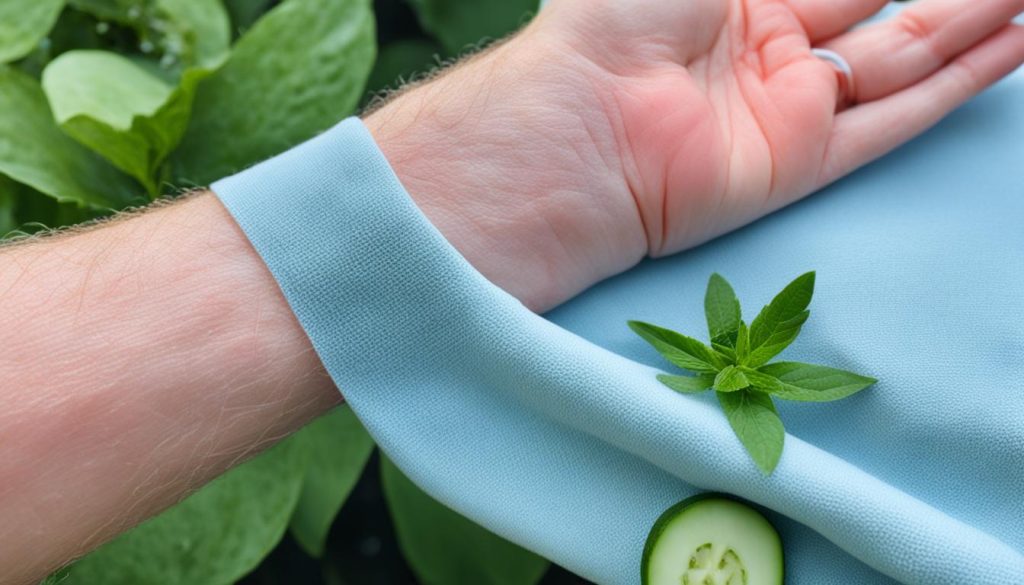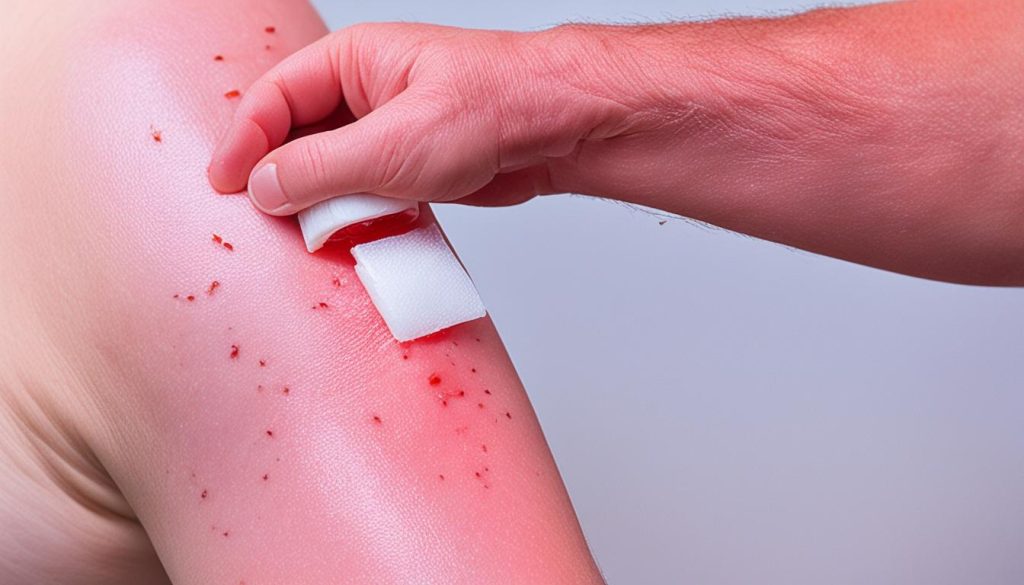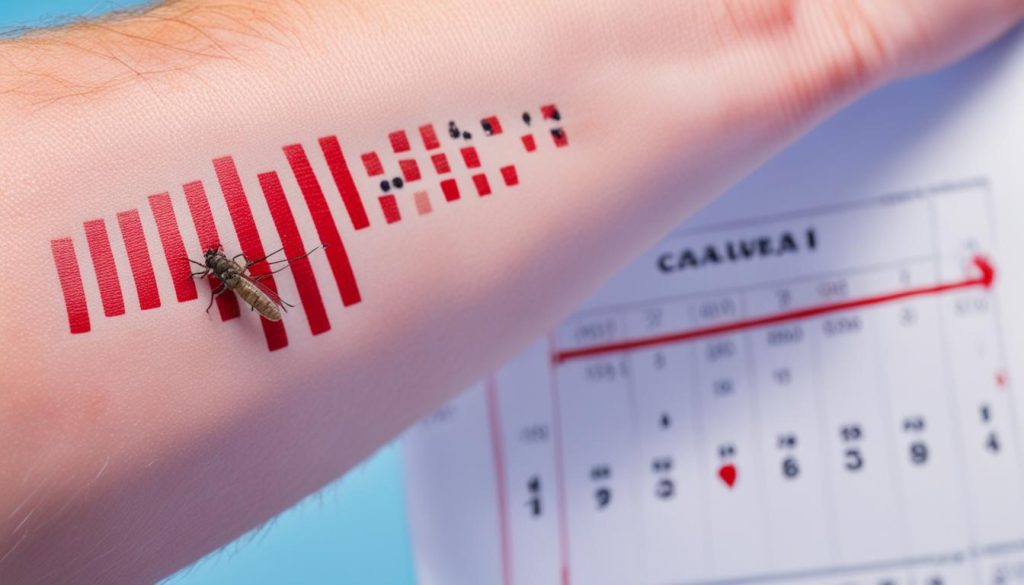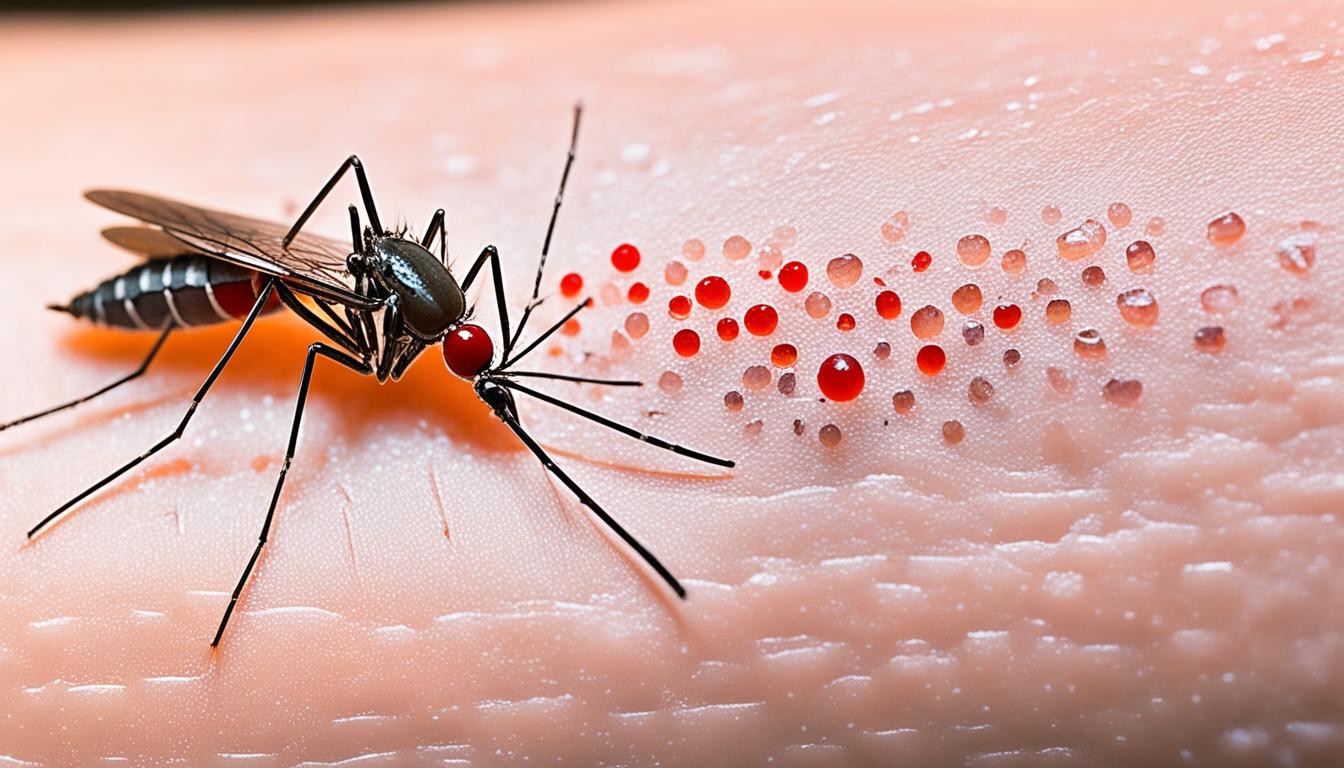If you’ve ever been bitten by a mosquito, you know how irritating those itchy bumps can be. But have you ever wondered how long it takes for mosquito bites to go away? In this article, we’ll delve into the duration of mosquito bites and provide you with some helpful tips for relief.
Mosquito bites typically appear as small, pink, itchy bumps that can show up within 20 minutes of being bitten. The itching usually peaks within 24-48 hours, and over the course of three to four days, the bite starts to fade. However, it may take up to a week for a mosquito bite to completely heal.
It’s important to note that some people might experience more severe reactions, such as skeeter syndrome or a severe mosquito bite allergy. In these cases, the healing process can take up to 10 days.
Whether you’re dealing with a typical mosquito bite or a more severe reaction, there are steps you can take to reduce itching and swelling. Avoid scratching the bite, as this can prolong healing and increase the risk of infection. Instead, consider applying over-the-counter hydrocortisone cream or calamine lotion to alleviate symptoms. Additionally, there are various home remedies you can try, such as using ice, oatmeal, honey, aloe vera, onions, garlic, essential oils, toothpaste, and witch hazel.
While mosquito bites can be bothersome, most heal within a week with proper care and treatment. In the following sections, we’ll explore why mosquito bites itch and how to reduce swelling, discuss allergic reactions to mosquito bites, provide tips for monitoring bite duration and symptoms of infection, and share preventive measures to help you avoid mosquito bites altogether.
Why Do Mosquito Bites Itch and How to Reduce Swelling?
Have you ever wondered why mosquito bites itch so much? When a mosquito bites, it injects saliva into your skin, which contains proteins that your body recognizes as foreign. In response to this invasion, your immune system releases histamines, causing localized itching and swelling.
Scratching mosquito bites may provide temporary relief, but it can actually make matters worse. Scratching the bites can break the skin and introduce bacteria, leading to infection and prolonged healing time. So, what can you do to reduce the swelling and relieve the itch?
Here are some effective strategies:
- Avoid scratching: It may be difficult, but resist the urge to scratch those itchy mosquito bites. Instead, try applying a cold compress or ice wrapped in a cloth to alleviate the discomfort.
- Over-the-counter creams and lotions: Hydrocortisone cream and calamine lotion are readily available and can provide relief from itching and reduce swelling. Apply as directed on the product label.
- Home remedies: There are several natural remedies you can try to soothe mosquito bites. For example, applying a paste of oatmeal and water, honey, aloe vera gel, or even sliced onions or garlic may help alleviate the itchiness and reduce swelling. Essential oils with anti-inflammatory properties, such as tea tree oil or lavender oil, can also provide relief when diluted and applied to the affected area.
To summarize, when a mosquito bites, it triggers an immune response that causes itching and swelling. Scratching can worsen the symptoms and lead to complications. It’s best to avoid scratching and instead follow these recommendations to reduce swelling and relieve the itch. If the symptoms worsen or you develop signs of infection, consult a healthcare professional for further evaluation and treatment.

Next, we will explore allergic reactions to mosquito bites, including rare but severe cases. Stay tuned!
Allergic Reactions to Mosquito Bites
Some people may experience allergic reactions to mosquito bites, such as skeeter syndrome or a full-body allergic reaction. Symptoms can include itching, swelling, warmth, blisters, hives, enlarged lymph nodes, joint stiffness, fever, headache, nausea, and even anaphylaxis in rare cases. In these cases, it is important to seek medical attention for proper diagnosis and treatment. Mosquito repellents containing picaridin and DEET are recommended to prevent allergic reactions.

Mosquito Bite Treatment Options
| Treatment Option | Description |
|---|---|
| Antihistamines | These medications can help relieve itching and reduce the allergic reaction caused by mosquito bites. |
| Topical Steroids | Corticosteroid creams or ointments can help reduce inflammation and itching associated with mosquito bites. |
| Cold Compress | Applying a cold compress or ice pack to the affected area can provide temporary relief from itching and swelling. |
| Calamine Lotion | Calamine lotion can help soothe itching and provide a cooling sensation on mosquito bites. |
| Baking Soda Paste | Creating a paste with baking soda and water and applying it to the bite can help reduce itching and inflammation. |
| Honey | Applying raw honey directly to mosquito bites can help reduce itching and promote healing. |
How Long Does It Take for Mosquito Bites to Go Away?
Mosquito bites can be bothersome and take time to heal. The recovery time for mosquito bites can vary, but it typically takes up to a week for the bite to completely heal. During this time, it’s important to monitor the progress of the bite and watch out for any signs of infection.
Signs of Infection
If you notice any of the following symptoms, it’s crucial to seek medical attention:
- Wide area of redness around the bite
- Noticeable swelling beyond the initial bite
- Discharge from the bite
- Worsening pain
- Fever
- Red lines streaking away from the bite
- Increased warmth around the bite
These symptoms may indicate an infection, and prompt treatment is necessary to prevent complications. It’s essential to consult a healthcare professional for proper diagnosis and appropriate treatment.
Mosquito Bite Treatment Timeline
While most mosquito bites heal within a week, it’s important to prioritize self-care during this period to promote healing and relieve discomfort. Here’s a general timeline of mosquito bite treatment:
- Immediate action: Clean the bite area with mild soap and water to prevent infection.
- First 24-48 hours: Apply cold compresses or ice to reduce swelling and alleviate itching. Over-the-counter hydrocortisone cream or calamine lotion can also help relieve itchiness.
- Following days: As the bite progresses, continue applying soothing remedies such as aloe vera gel, honey, or oatmeal baths to promote healing and relieve any lingering itchiness.
Remember to avoid scratching the bite, as it can prolong the healing process and increase the risk of infection.

Monitoring the progress of the bite and seeking medical attention if needed are crucial steps in ensuring a smooth recovery. Proper treatment and monitoring can help prevent complications and ensure a timely healing process.
Check out the next section for valuable tips on how to prevent mosquito bites and minimize the risk of mosquito-borne diseases.
How to Prevent Mosquito Bites?
Mosquito bites can be irritating and potentially dangerous, but there are steps you can take to reduce your risk of getting bitten. By implementing the following mosquito bite prevention strategies, you can enjoy your time outdoors without the constant annoyance of these pesky insects.
1. Use Mosquito Repellents
Mosquito repellents are a crucial tool in preventing mosquito bites. Look for repellents that contain ingredients like picaridin or DEET, as they have been proven effective in repelling mosquitoes. Apply the repellent according to the instructions on the product label, especially during peak mosquito activity times.
2. Dress Appropriately
Wearing long sleeves, long pants, and socks can provide an additional layer of protection against mosquito bites. Opt for lightweight and loose-fitting clothing to stay cool while minimizing exposed skin.
3. Avoid Peak Mosquito Activity Times
Mosquitoes are most active during dawn and dusk when their feeding habits are at their peak. If possible, try to limit your outdoor activities during these times or take extra precautions to protect yourself, such as using mosquito repellents and wearing appropriate clothing.
4. Eliminate Standing Water
Mosquitoes breed in stagnant water, so removing any standing water around your home can help reduce their population. Regularly empty and clean any containers that collect water, such as flower pots, bird baths, and gutters.
5. Use Mosquito Nets and Screens
In areas where mosquitoes are prevalent, using mosquito nets and screens can provide an additional barrier of protection. Install window and door screens to prevent mosquitoes from entering your home, and use mosquito nets while sleeping or when spending time in outdoor areas without adequate protection.
To summarize, preventing mosquito bites involves a combination of protective measures, such as using mosquito repellents, wearing appropriate clothing, avoiding peak mosquito activity times, eliminating standing water, and using mosquito nets and screens. By following these strategies, you can significantly reduce the risk of mosquito bites and the potential transmission of mosquito-borne diseases.

| Prevention Strategies | Effectiveness |
|---|---|
| Using mosquito repellents | Highly effective when used correctly |
| Dressing appropriately | Provides additional physical barrier |
| Avoiding peak mosquito activity times | Reduces exposure to mosquitoes |
| Eliminating standing water | Reduces mosquito breeding sites |
| Using mosquito nets and screens | Provides physical barrier indoors and outdoors |
Conclusion
Mosquito bites can cause itching, swelling, and discomfort, but with proper care and treatment, they usually heal within a week. It is important to avoid scratching the bites, as this can prolong the healing process and increase the risk of infection. Instead, applying soothing remedies such as over-the-counter hydrocortisone cream or calamine lotion can help reduce swelling and relieve itching.
In cases of severe reactions or signs of infection, seeking medical attention is crucial. Allergic reactions to mosquito bites can occur, with symptoms ranging from itching and swelling to more severe reactions such as skeeter syndrome or a full-body allergic reaction. If these symptoms arise, it is important to consult a healthcare professional for proper diagnosis and treatment.
Preventing mosquito bites is also key in minimizing the risk of mosquito-borne diseases. Using mosquito repellents containing picaridin or DEET, wearing protective clothing, and avoiding peak mosquito activity times can help prevent bites. Additionally, eliminating standing water where mosquitoes breed and using mosquito nets and screens can provide further protection.
By following these important steps in the healing process and implementing preventive measures, individuals can minimize the discomfort and potential health risks associated with mosquito bites. Remember, proper care, treatment, and prevention are essential for a safe and comfortable experience outdoors.




